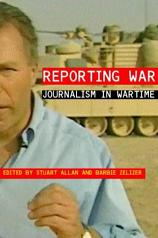
Reporting War
Stuart Allan & Barbie Zelizer
374 pages including index
published in 2004
Having kept a politically orientated weblog the past half decade or so I've become acutely aware of the limitations of journalism, particularly during wartime. The current war for South Ossetia provides a good example of these limitations, were we're seeing live how difficult it is for journalists to even get to the combat zone, not to mention how dangerous, as the death of a Dutch camera man proved. Perhaps more worrying, as the conflict continued the reporting on it which started off fairly neutral has become more and more partisan, especially once the United States and the European Union got involved in its resolution, with Russia pictured as the agressor when in fact it was Georgia who started the war. Russian statements are treated with skepticism while quotes from approved official sources, like the Pentagon or NATO are quoted verbatim. In general the war is treated through an American or European lens, rarely from the point of view of the Russians or Georgians, let alone the Ossetians...
All these problems are described in Reporting War, a collection of essays on the role of journalism in wartime, its difficulties and dillemas. Published a year after the American invasion of Iraq, a lot of attention is of course paid to the problems of that particular war. The book doesn't just look at the role of the journalists themselves, but also how they are dealt with by armies and governments involved in war, with a specific focus on the US army's management of journalist during the first and second Gulf War. What's more, several essays look beyond the physical reaity of reporting wars to the role the media plays in general in covering wars. Not every conflict is covered equally after all.
Reporting War is divided into three parts, the first looking at war in general, the second at how journalists and the media report on wars and the third taking a look at the War on Iraq. Most of the essays look at these subjects from the context of the British or American media, but there is also attention to other countries, including an examination of how the Australian media goes about war journalism and how in India the conflict in Kashmir is priviledged in coverage above the conflicts on India's North West frontier. As is usually the case with books like this, the essays vary in quality and interest, but with one exception there are no real clunkers.
That one exception is an article on "the PR of terror: how new-stye wars give voice to terrorists", which argues that the international media, especially after the September 11 attacks, has given a voice to terrorism it lacked before, by actually interviewing terrorists and giving terrorist organisations room to explain themselves. There is a kernel of truth in this, but the authors take a too black and white view of this subject. It's the point of view of the Bush administration after the September 11 attacks, where terrorists are evil men doing evil deeds purely for the hell of it and there's no need to understand their motives because they just act out of pure evil. In the real world terrorists can have legitamite grievances or even turn from criminal to head of state (just ask Menachem Begin). The esay's accusation of interviews with terrorists being propaganda makes little sense therefore.
Reporting War is interesting, though much of what it examines should be know to anybody who has read Herman and Chomsky's Manufacturing Consent, or Nick Davies Flat Earth News. What makes Reporting War worthwhile is the range of different approaches with which this subject is tackled.
Read more about:
Stuart Allan
Barbie Zelizer,
Reporting War,
journalism,
book review